STATEHOUSE REPORT | ISSUE 20.31 | JULY 30, 2021
BIG STORY: Three-day sales tax holiday starts Aug. 6
LOWCOUNTRY, Ariail: Higher office
COMMENTARY, Brack: Anti-mask mandate will hurt South Carolina’s children
SPOTLIGHT: Riley Institute at Furman University
MY TURN: Infrastructure reform can level playing field for S.C. businesses
FEEDBACK: On McMaster and masks
MYSTERY PHOTO: Classical statues
Three-day sales tax holiday starts Aug. 6
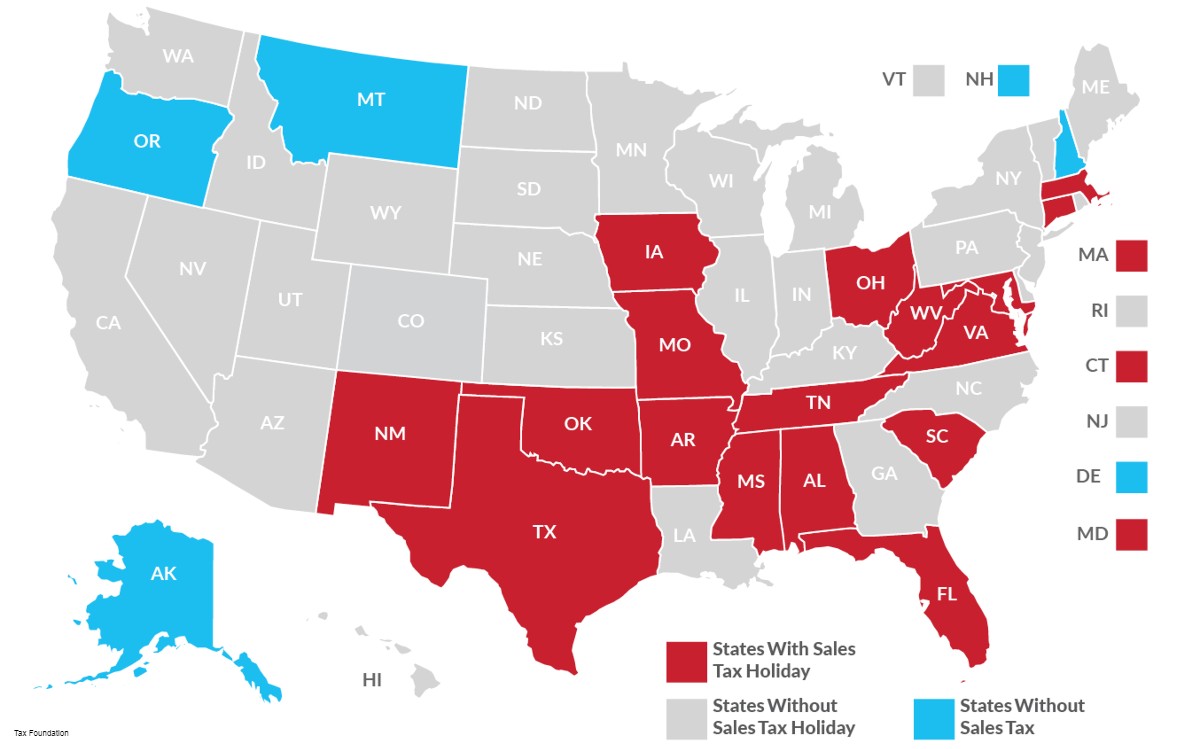
Staff reports | The state’s annual weekend-long sales tax holiday kicks off Aug. 6 and runs through Aug. 8 — a three-day period during which shoppers are able to buy certain items in South Carolina stores, both online and in stores, without paying a 6 percent state sales tax and applicable local taxes.
Among the items that can be purchased are school supplies, clothing, footwear, computers, musical instruments and outerwear. Not eligible for the exemption are eyewear, furniture, cell phones and office supplies. For a full list of sales tax-free items, check out the state’s full guide to the tax holiday.
Weekend to save some
After a tough year for businesses with COVID-19 restrictions in place and many consumers feeling uncertain of their employment status, state officials say the tax-free weekend is a welcomed event and great opportunity for shoppers to support local businesses and their communities.
“Tax Free Weekend is a great way for South Carolina shoppers to save money, and it’s also a great way to demonstrate our support of South Carolina businesses who have struggled this past year,” said S.C. Department of Revenue Director Hartley Powell in a press release.
According to the agency, last year’s sales tax weekend resulted in the sale of more than $18.1 million in eligible items.
But also a “political gimmick”
While proponents laud the weekend for promoting economic growth, the data isn’t as convincing, according to the nonpartisan Tax Foundation:
“The evidence (including a 2017 study by Federal Reserve researchers) shows that, instead of increasing purchases, consumers simply shift the timing of purchases they were already going to make. For most who shop during sales tax holidays, the exemptions simply provide a modest and unexpected benefit for doing something they would have done anyway.”
What sales tax holidays really do, the organization says, is to mislead consumers about savings. Low-income groups may get some savings, but higher-income groups get more.
The organization concludes, “Sales tax holidays are political gimmicks that distract from genuine, permanent tax relief. If a state must offer a ‘holiday’ from its tax system, it is an implicit recognition that the tax system is uncompetitive. If policymakers want to save money for consumers, they should work to reduce the sales tax rate year-round.”
Samantha Connors of the Charleston City Paper contributed to this story. Have a comment? Send to feedback@statehousereport.com
Higher office
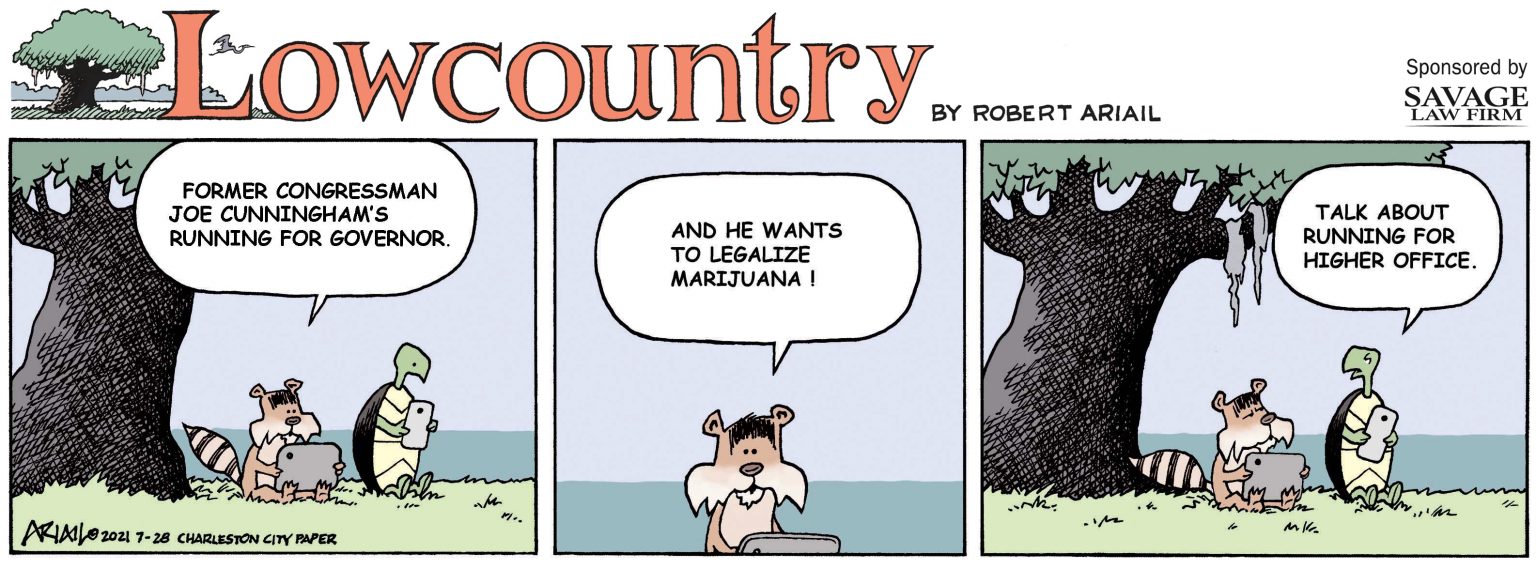
Cartoonist Robert Ariail always has an interesting take on what’s going on in South Carolina. His weekly “Lowcountry” strip is originally drawn for our sister publication, the Charleston City Paper. Love the cartoon? Hate it? What do you think: feedback@statehousereport.com. Check out the Best of Charleston 2021.
Anti-mask mandate will hurt South Carolina’s children
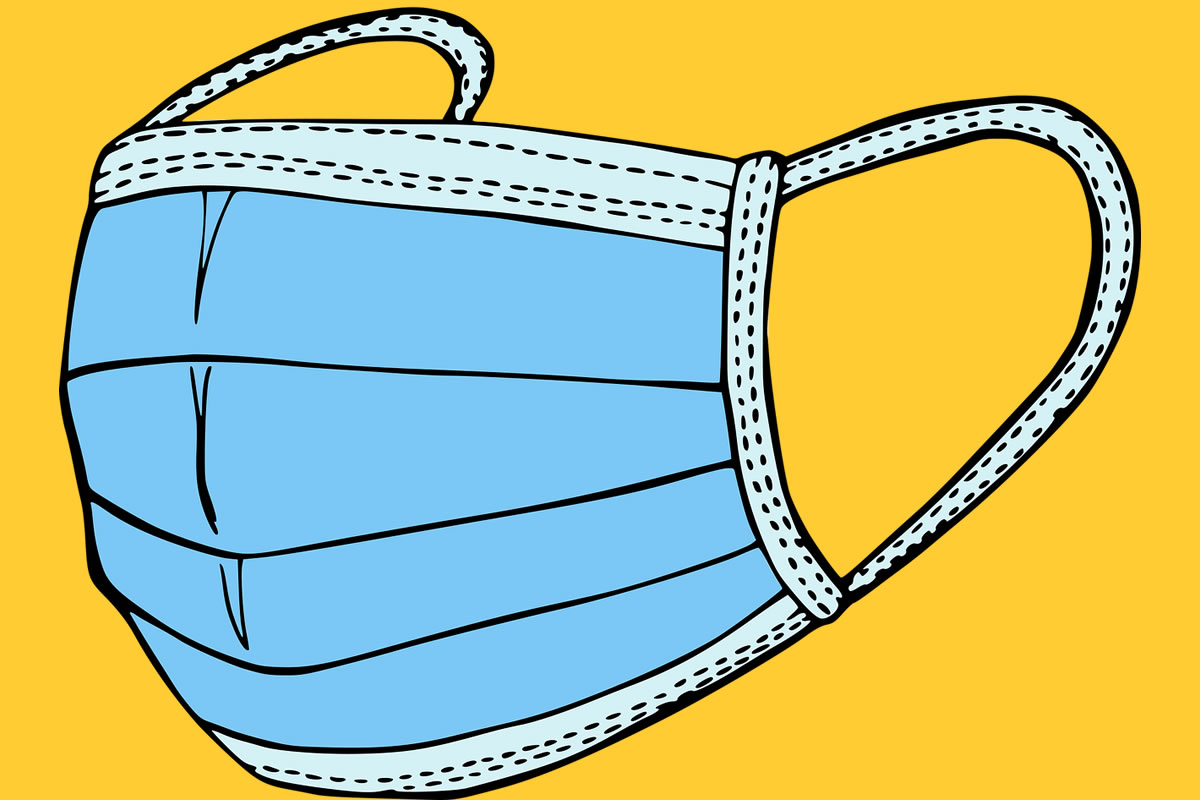
By Andy Brack, editor and publisher | The enormity of anti-science fervor in the Republican-controlled South Carolina legislature that will keep students, most unvaccinated, from wearing masks is mind-blowingly ignorant.
 As a result, too many children will get or spread coronavirus — now worse than last year at this time because of a new, more contagious strain — and more will suffer. Children and more adults may die, thanks to the lame-brained GOP General Assembly’s lockstep denial of science.
As a result, too many children will get or spread coronavirus — now worse than last year at this time because of a new, more contagious strain — and more will suffer. Children and more adults may die, thanks to the lame-brained GOP General Assembly’s lockstep denial of science.
“No school district, or any of its schools, may use any funds appropriated or authorized pursuant to this act to require that its students and/or employees wear a facemask at any of its educational facilities.” That’s the policy in the current state budget.
Make no mistake: Conservative lawmakers didn’t simply use a procedural, one-year budget proviso to say no to masks as they bowed to their holy mantra of personal freedom. They did it intentionally to push a narrow political viewpoint without regard to the health, welfare or safety of South Carolina’s students and parents.
It’s pitiful and it’s going to come back to bite South Carolina’s butt. Don’t look for the pandemic, now surging again with double-digit rates of positive tests, to ebb anytime soon. The rush to return to normal will keep normal from returning anytime soon.
What’s unfortunate is that state legislators are unlikely to take corrective action in a coming special session even though the nation is starting to “mask up” again following a revised guidance from the Centers for Disease Control and Prevention (CDC). It recommends that vaccinated Americans wear masks again inside in places where the virus is raging, such as South Carolina.
“It’s such a political issue now, I doubt the legislature would wade into it knowing the governor would veto,” said one senior GOP source in South Carolina who asked not to be named.
House Democrats aren’t happy with what has transpired.

“To be clear, the Budget Proviso 1.108, prohibiting masks requirements in public schools, was passed with Republicans votes only in the House,” Columbia Democratic Rep. Wendy Brawley told Statehouse Report. “I, along with other House Democrats, voted against the proviso because we believe that locally elected school boards should make those safety decisions.
It is my sincere hope that my Republican colleagues will reverse the proviso and allow school districts to do what is necessary to ensure the safety of students, teachers and staff in public schools. Political posturing should not compromise student safety!”
Republicans, including Gov. Henry McMaster who has been leading the anti-mask effort, whine mask-wearing should be voluntary and up to parents, not the government.
Hogwash. It’s government’s responsibility to ensure the safety of all of its citizens from enemies domestic and foreign — including the virus that has infected more than 500,000 South Carolinians, wreaked untold havoc on families and cost billions of dollars.
What’s so bloomin’ conservative about a simple thing like wearing a mask when the financial costs to society skyrocket just to deal with the devastating outcomes? Why is the GOP so bloody scared about a little shot that’s almost universally effective at dampening the virus?
You don’t hear caterwauling about bringing a car to a halt at stop signs or getting car insurance to have the privilege to drive. Or as our friends at the Greenwood Index-Journal sarcastically wrote this week, why should the state even have health regulations?
“If restaurant owners want to store food in non-refrigerated containers, let mold form in ice machines and not require employees to wash their hands before handling food and after bathroom visits, so what? They have rights, too. DHEC should get the heck outta the business of these struggling restaurateurs. Taking chances with your health by patronizing those restaurants is, after all, your choice. Just like wearing a mask or getting a vaccination.”
Republicans have led this state for more than two decades. With the anti-leadership they are showing from top to bottom in South Carolina, it is truly time to throw the bums out.
- Have a comment? Send to: feedback@statehousereport.com.
Riley Institute at Furman University
 The public spiritedness of our underwriters allows us to bring Statehouse Report to you at no cost. This week’s spotlighted underwriter is Furman University’s Riley Institute, which broadens student and community perspectives about issues critical to South Carolina’s progress. It builds and engages present and future leaders, creates and shares data-supported information about the state’s core challenges, and links the leadership body to sustainable solutions.
The public spiritedness of our underwriters allows us to bring Statehouse Report to you at no cost. This week’s spotlighted underwriter is Furman University’s Riley Institute, which broadens student and community perspectives about issues critical to South Carolina’s progress. It builds and engages present and future leaders, creates and shares data-supported information about the state’s core challenges, and links the leadership body to sustainable solutions.
Launched in 1999, the Institute is named for former South Carolina Governor and former United States Secretary of Education Richard W. (Dick) Riley. It is committed to nonpartisanship in all it does and to a rhetoric-free, facts-based approach to change.
- Learn more about the Riley Institute.
- Also learn more about the Riley Institute’s Center for Education Policy and Leadership.
Infrastructure reform can level field for S.C. businesses
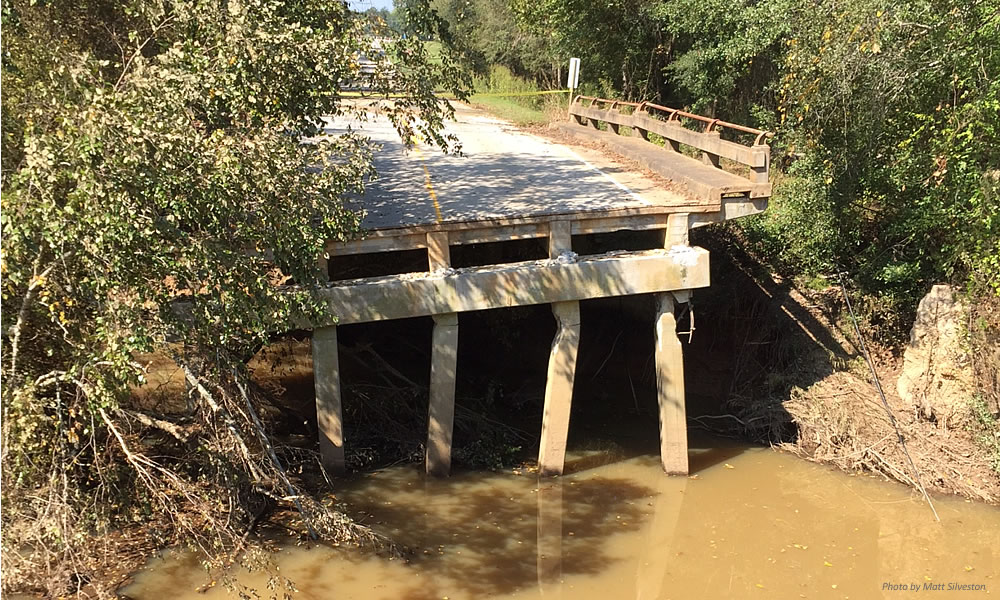
By Jacquie Berger and Xiomara Peña, special to Statehouse Report | Small businesses are the power behind our communities. South Carolina alone has 430,000 small businesses that employ more than 800,000 people. Millions more small businesses employ millions more people across the country.


However, during the pandemic, small businesses faced unique economic challenges to keep their doors open. The pandemic made it apparent that small businesses need robust infrastructure support to grow and thrive.
The bipartisan infrastructure plan in Congress will fund much-need investments in physical and broadband infrastructure that will revitalize the local and national economy, and position small businesses to withstand the next financial crisis. Small businesses are glad to see our elected officials come together on efforts to pass legislation that will create jobs, improve wages, and support entrepreneurship and innovation.
The fact is that small businesses rely on physical infrastructure more than large businesses because they don’t have the resources to adapt to challenges and setbacks posed by faulty roads, bridges, and broadband. Small business owners can’t just move their business location if the road to get there is filled with potholes. Instead, they hope that the roads are manageable enough for customers to navigate.
In South Carolina, there are 745 bridges and over 3,780 miles of highway in poor condition. It’s no longer easy for potential customers to drive down Spruill Avenue in North Charleston for their favorite meal with owners that have contributed to the fabric of the community. Those customers are now faced with a longer and bumpier commute and have very few alternatives, such as bike lanes and walking paths.
South Carolinians are very familiar with the impacts of disinvestment in broadband infrastructure. There are tremendous gaps in reliable broadband access in rural pockets of South Carolina and low-income areas. Twelve percent of South Carolinians live in areas where no broadband infrastructure provides minimally acceptable speeds. And more than half of South Carolinians live in areas where there is only one provider. During the pandemic and through Lowcountry Local First’s Good Enterprises program, we’ve heard firsthand about the challenges small business owners of color and in rural communities faced when trying to pivot their business model to adopt online platforms with little or no high-speed Internet access.
The pandemic created an online customer base that many small business owners did not expect, and many were unprepared. However to sustain this base, create a level playing field for small businesses across the country, and build a long-term small business ecosystem, we must invest in enhanced and expanded broadband that will allow owners to access customers and suppliers and create demand for the goods and services they have to sell.
It’s also important to note that while the bipartisan infrastructure plan includes critical investments that will help small businesses on their road to recovery after the pandemic, more is needed to help them overcome the economic obstacles that they are currently facing. They need infrastructure reform to include provisions outlined in the White House’s American Jobs Plan to get them to a level of substantial recovery.
Additionally, we hope that any final infrastructure package will include more unrestricted grant and loan programs for small businesses. The ongoing need for hard-hit entrepreneurs who are desperate for relief will require a long-term, substantial commitment that extends beyond small-dollar grants and loans.
While the plan is finally moving forward after weeks of delays, small businesses can’t afford to wait any longer for legislation that will help support entrepreneurship and innovation. We can’t stop now, not when there are opportunities on the table to make real and significant changes to how we can genuinely help our small businesses thrive and grow. Policymakers must support the movement on this bill and not get distracted by political theater. Small, local businesses in South Carolina and around the country need action now.
Jacquie Berger is executive director of Lowcountry Local First in Charleston and a partner of Small Business Majority, a national organization where Xiomara Peña is vice president for engagement. Have a comment? Send to: feedback@statehousereport.com.
On McMaster and masks
![]() To the editor:
To the editor:
Why anyone would ever follow Gov. Henry McMaster’s failed leadership on the virus is beyond me? The South is a viral mess because of Republican governors. They have blood on their hands.
— Gere B. Fulton, Columbia
On Ariail’s cartoon about heat and carriage horses
To the editor:
— Ellen Harley, Charleston
- Send your letters or comments to: feedback@statehousereport.com
Classical statues
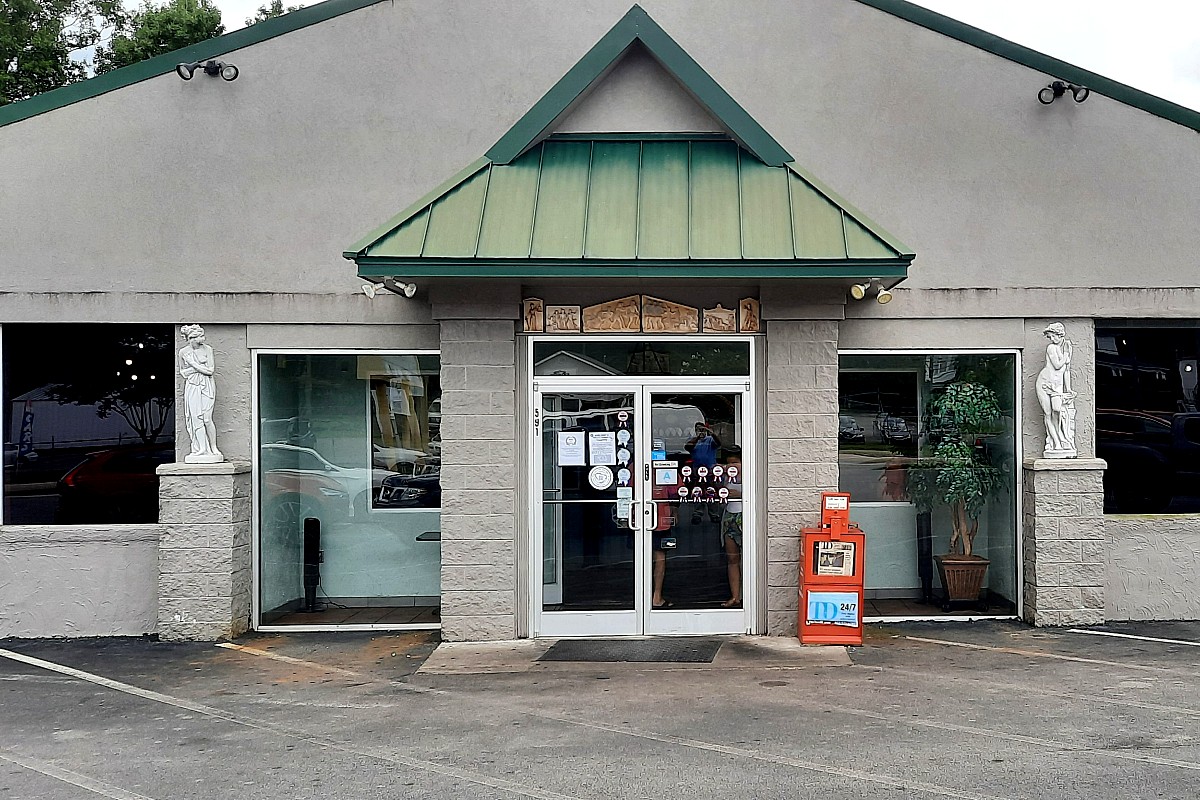
 The entrance to this business is framed by two classical statues. Where is it in South Carolina? Send your guess to feedback@statehousereport.com — and remember to include your name, home city and contact information. (See closeup at right.
The entrance to this business is framed by two classical statues. Where is it in South Carolina? Send your guess to feedback@statehousereport.com — and remember to include your name, home city and contact information. (See closeup at right.
Last week’s mystery, “Rear view,” showed a view of the Partisan Generals Monument on the Statehouse grounds looking toward Trinity Cathedral. The 27-foot-tall column built in 1913 honors Revolutionary War Generals Thomas Sumter, Francis Marion and Andrew Pickens.
 Congratulations to these eagle-eyed spotters who identified the photo: State Rep. Cezar McKnight of Kingstree; Karen Owens and Elizabeth Jones, both of Columbia; Kevin Mertens of Greenville; George Graf of Palmyra, Va.; and Bill Segars of Hartsville.
Congratulations to these eagle-eyed spotters who identified the photo: State Rep. Cezar McKnight of Kingstree; Karen Owens and Elizabeth Jones, both of Columbia; Kevin Mertens of Greenville; George Graf of Palmyra, Va.; and Bill Segars of Hartsville.
- Send us a mystery. If you have a photo that you believe will stump readers, send it along (but make sure to tell us what it is because it may stump us too!) Send to: feedback@statehousereport.com and mark it as a photo submission. Thanks.
ORDER NOW: Copies are in Lowcountry-area bookstores now, but if you can’t swing by, you can order a copy online today.
ABOUT STATEHOUSE REPORT
Statehouse Report, founded in 2001 as a weekly legislative forecast that informs readers about what is going to happen in South Carolina politics and policy, is provided to you at no charge every Friday.
- Editor and publisher: Andy Brack, 843.670.3996
Donate today
We’re proud to offer Statehouse Report for free. For more than a dozen years, we’ve been the go-to place for insightful independent policy and political news and views in the Palmetto State. And we love it as much as you do.
But now, we can use your help. If you’ve been thinking of contributing to Statehouse Report over the years, now would be a great time to contribute as we deal with the crisis. In advance, thank you.
Buy the book
Now you can get a copy of editor and publisher Andy Brack’s We Can Do Better, South Carolina! ($14.99) as a paperback or as a Kindle book ($7.99). . The book of essays offers incisive commentaries by editor and publisher Andy Brack on the American South, the common good, vexing problems for the Palmetto State and interesting South Carolina leaders.
More
- Mailing address: Send inquiries by mail to: P.O. Box 21942, Charleston, SC 29413
- Subscriptions are free: Click to subscribe.
- We hope you’ll keep receiving the great news and information from Statehouse Report, but if you need to unsubscribe, go to the bottom of the weekly email issue and follow the instructions.
- Read our sister publications: Charleston City Paper (every Wednesday) | Charleston Currents (every Monday).
- © 2021, Statehouse Report, a publication of City Paper Publishing, LLC. All rights reserved.




Pingback: Statehouse Report – NEW for 7/30: On the sales tax holiday, masks, infrastructure – Statehouse Report